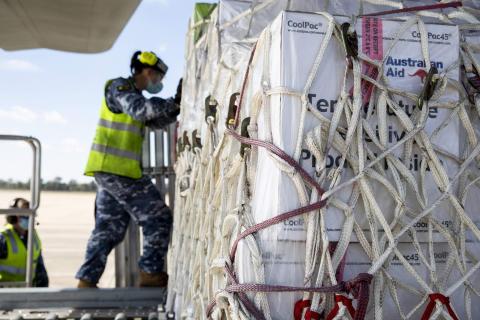Papua New Guineans head to the polls on the 24 June in a national election which will be as fiercely contested as its precedents. Five years ago, intense candidate rivalry, carnival showmanship and controversy about electoral roll discrepancies were the hallmarks of a drawn-out contest between veteran post-Independence leader Michael Somare and the People’s National Congress leader Peter O’Neill, who was eventually declared winner.
Many voters in Port Moresby during that 2012 election spoke of me of their yearning for leaders who would seriously tackle corruption, spur more equitable economic development, and improve public service delivery.
Similar issues are likely to be influential again this time round.
Papua New Guinean economist and commentator, Busa Jeremiah Wenogo believes education, health and infrastructure development will lead the concerns of rural voters, while in the cities law and order, jobs, housing and basic services are likely to be the critical issues.
'Unemployment in cities across PNG is becoming a really big problem,' Wenogo told me. 'This has not been helped by the government’s negative attitude towards the informal economy that most of the unemployed youth and older men and women fall back on for survival'.
He said that, due to the ongoing housing crisis in major cities and towns, the government’s decision to give land away to developers is also a contentious issue. 'Settlements in cities are increasing at an unprecedented rate due to the massive influx of people coming in from other provinces'. Those settlers are demanding the government recognise land titles and provide access to essential utilities.
High profile activism in the capital last year also revealed deep anger about corruption, especially among the educated younger generation. In June, perceived attempts by Prime Minister O’Neill to avoid investigations into his alleged involvement in the mismanagement of $30 million in public funds prompted protests by University of Papua New Guinea students and clashes with armed police. Riots followed in regional cities, such as Lae, Goroka and Mt Hagen.
O’Neill won the last election on a political high, embodying the hopes of many citizens for change and a better future. Four years later, widespread anger toward government manoeuvres deemed to dodge transparency prompted a vote of no confidence in parliament. O'Neill's government survived that vote in July, winning with a handsome margin, but people are still angry.
Dagia Aka of the Youth Against Corruption Association (YACA) at Transparency International PNG (TIPNG) believes that 'because of all that has happened, Papua New Guineans now want change'.
Aka believes a populist backlash against the political establishment is a possibility. The PNG election result could echo the outcomes of the US presidential election and the Brexit referendum in the UK, events associated with a wave of discontent, particularly in countries’ hinterlands, with socioeconomic marginalisation, lack of benefits from globalisation, and political elitism.
'A good number of political figures [in PNG] are very active on social media...and though some of their views on certain issues are quite extreme, they have been gaining support from people who are simply frustrated,' Aka said.
Meanwhile the incumbent administration extols its efforts to deliver better development outcomes. In a speech delivered in Australia last December, O’Neill claimed that ‘since coming to office we have doubled the number of children in our schools...law and order is improving around the nation....we have also made substantial investment in restoring critical infrastructure.’
Tuition-fee free education has been introduced and in 2014 K7 billion ($2.87 billion) was pledged for road works over five years. Two years ago when I travelled along the Highlands Highway, workers were resealing sections of the road, but it is difficult to judge how much of the pledged funds have been spent, and how effectively.
Theresa Jaintong, President of the National Council of Women, comments that, while basic services are government priorities, women see that hardship is still widespread; affecting an estimated 40% of the population, according to the World Bank.
Lower commodity prices in recent years, diminished government revenues, and high public debt have affected funding for services. Spending cuts to education and transport began in early 2015. The country’s GDP growth has fallen from 9.9% in 2015 to a forecast 3% in 2017.
Commentators such as Wenogo predict the economy will struggle to pick up, due in part to high government debt.
'Although the government debt level is projected to drop in 2017 through to 2019, the government is already locked into longer term loans so the debt level is expected to rise further,' he said. He also believes the government's plan to raise an additional K400 million in tax revenue in 2017 looks unattainable unless the Internal Revenue Commission's capacity to ensure compliance is boosted.
Evidence of the faltering economy effects on people’s lives is 'overwhelming', according to Dagia Aka, who reports prices of goods and services have gone up and small businesses are barely keeping their heads above water.
The immense diversity of Papua New Guinea makes it difficult to predict what will happen when the estimated 5.4 million voters head to polling stations and the ten-fold increase in the candidate nomination fee by the Electoral Commission could prevent would-be challengers to the status quo.
Wenogo believes his country needs a major shake-up. 'The so called establishment or "big men" in this country have been allowed to wreak havoc at will at the expense of the masses'. But while there is 'no doubt' that people are frustrated and angry, for a 'Trump-like moment to happen in PNG someone or a group has to stand up, inspire the people and create a "snowball" effect to usher in change'.

